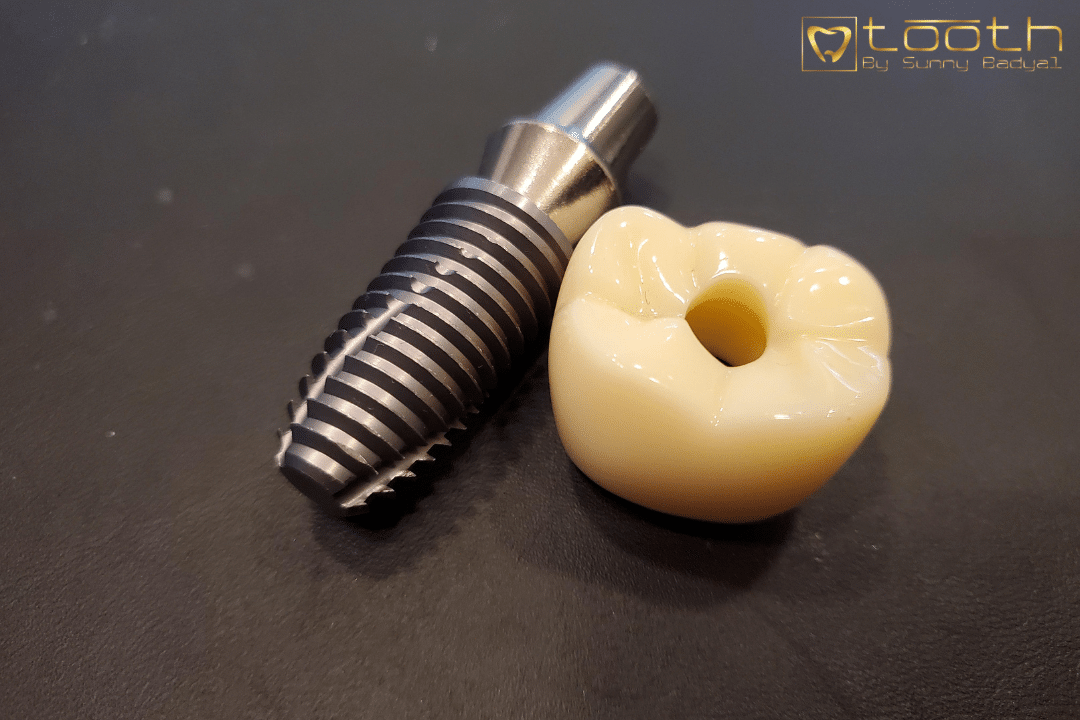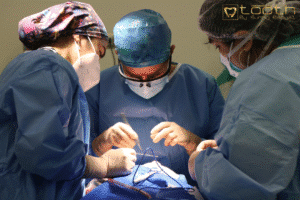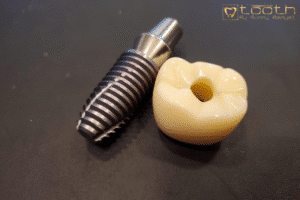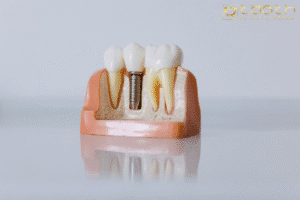As a dentist with nearly a decade of experience in full-mouth rehabilitation and implant dentistry, one of the most important conversations I have with patients is not if they need dental implants, but what type. And that’s a question that often goes overlooked.
Choosing the right kind of dental implant isn’t one-size-fits-all. It depends on your bone health, oral condition, cosmetic goals, and long-term expectations. The right type of implant can offer a lifetime of comfort, confidence, and function, while the wrong one may lead to complications or poor outcomes.
That’s why at Tooth by Sunny Badyal, we take the time to educate, personalize, and plan your treatment with precision. In this post, I’ll break down the six major types of dental implants, so you’re informed, empowered, and ready to make the best decision for your smile.
Endosteal Implants: The Gold Standard of Modern Implant Dentistry
Endosteal implants are the most commonly used type of dental implant today—and for good reason. These implants are surgically placed directly into the jawbone, acting as artificial roots that anchor the replacement teeth (crowns, bridges, or dentures).
What Are They Made Of?
Endosteal implants are typically made of titanium or zirconia, both of which are biocompatible materials. Titanium in particular is known for its ability to fuse naturally with bone through a process called osseointegration, creating a stable, long-lasting foundation for prosthetic teeth.
✅ Pros of Endosteal Implants:
High Success Rate: Studies show success rates exceeding 95% over 10 years when properly maintained.
- Strong and Durable: They mimic natural tooth roots and restore nearly full chewing function.
- Versatile: Suitable for single teeth, bridges, or even full-mouth restorations.
- Long-Term Bone Health: Stimulates the jawbone and helps prevent bone loss.
⚠️ Cons of Endosteal Implants:
- Requires Adequate Bone Density: Not ideal for patients with significant bone loss unless a bone graft is performed.
- Surgical Procedure Required: Healing time is typically 3–6 months before the final restoration is placed.
- Not Immediate: It’s a multi-step process—planning, placement, healing, then final restoration.
- Best Suited For: Patients with healthy, dense jawbone and good overall oral hygiene.
Ideal for individuals who want a permanent, stable solution and are comfortable with a short healing period.
Often recommended for those needing single-tooth replacements or implant-supported bridges.
Subperiosteal Implants: A Specialized Option for Limited Bone Support
While not as common today, Subperiosteal implants are a vital alternative for patients who can’t support traditional implants due to insufficient jawbone density—especially in the lower jaw.
Unlike endosteal implants, which are placed into the bone, subperiosteal implants sit on top of the jawbone but underneath the gum tissue. A custom-made metal framework is designed to rest securely on the bone, with posts protruding through the gums to hold the prosthetic teeth.
Scientific Backing:
Subperiosteal implants are often recommended when bone grafting is not a viable or preferred option. While they don’t osseointegrate like titanium endosteal implants, modern advancements in design and materials have improved their success in specific clinical situations.
✅ Pros of Subperiosteal Implants:
No Bone Grafting Required: Ideal for patients with minimal bone who want to avoid invasive grafting procedures.
- Shorter Treatment Timeline: Since bone graft healing isn’t required, treatment is often faster.
- Custom Fit: The implant framework is tailored precisely to the shape of your jaw for maximum stability.
⚠️ Cons of Subperiosteal Implants:
- Lower Long-Term Stability: Without direct fusion to the bone, they may not be as secure or durable as endosteal implants.
- Higher Risk of Complications: Potential for post-surgical infection or gum irritation around the exposed posts.
- Limited Availability: Fewer dentists specialize in this approach due to the rise of bone grafting solutions that enable endosteal placement.
Best Suited For:
- Patients with significant jawbone loss who don’t want or aren’t candidates for bone grafting.
- Elderly individuals or medically compromised patients where a shorter, less invasive treatment path is preferable.
- Those looking for a functional tooth replacement without the complexity of rebuilding the jaw structure.
Zygomatic Implants: A Lifeline for Severe Bone Loss in the Upper Jaw
Zygomatic implants are a highly specialized type of dental implant designed for patients with severe bone loss in the upper jaw, particularly where traditional implants and even bone grafts are not viable. Instead of being anchored in the jawbone, these extra-long implants are surgically placed into the zygomatic bone—also known as the cheekbone.
Because the zygomatic bone is naturally dense and strong, it provides a stable and durable foundation for supporting a full arch of upper teeth.
Scientific Backing:
The zygomatic bone resists resorption (shrinkage), making it ideal for long-term implant anchorage. Studies have shown zygomatic implants to be highly successful even in challenging cases, with success rates reaching 96–98% over 5 years in experienced hands.
✅ Pros of Zygomatic Implants:
- No Need for Bone Grafts or Sinus Lifts: Ideal for patients with extreme maxillary bone loss.
- Faster Treatment Timeline: In many cases, teeth can be placed the same day as surgery (immediate loading).
- Stable, Long-Term Results: Offers a secure foundation even when conventional methods aren’t an option.
- Improved Quality of Life: Restores oral function and facial structure when other treatments fail.
⚠️ Cons of Zygomatic Implants:
Highly Complex Surgery: Requires advanced surgical skill and precise planning.
Limited to Full-Arch Cases: Not suitable for replacing a single tooth—typically used in All-on-4 or All-on-6 procedures.
Higher Initial Cost: Due to its complexity and customization, it is more expensive than standard implant options.
Best Suited For:
Patients with advanced bone loss in the upper jaw, especially after long-term denture use.
Individuals who’ve been told they’re not candidates for traditional implants.
Patients seeking full-arch restoration with immediate results and long-term reliability.
All-on-4 Dental Implants: Full Smile Restoration with Just Four Implants
The All-on-4 dental implant system is a revolutionary solution for patients who are missing most or all of their teeth in a jaw. Instead of replacing each missing tooth with a single implant, this technique uses four strategically placed implants to support a full arch of fixed prosthetic teeth.
Two implants are placed vertically in the front of the jaw, while the other two are angled in the back to maximize contact with available bone. This design allows for excellent support without the need for bone grafting in most cases.
Scientific Backing:
Developed by Nobel Biocare, All-on-4 has a proven success rate of over 95%, and numerous clinical studies show strong outcomes for both functionality and patient satisfaction, even in cases of moderate bone loss.
✅ Pros of All-on-4 Implants:
- Immediate Results: In many cases, a full set of temporary teeth is placed the same day.
- No Bone Grafts Needed: Strategic implant angling avoids the need for additional surgery.
- Cost-Effective: Requires fewer implants to restore a full arch, reducing overall treatment costs.
- Natural Look & Feel: Provides stable, life-like prosthetic teeth with strong chewing function.
- Quick Recovery: Less invasive compared to placing 8–10 individual implants.
⚠️ Cons of All-on-4 Implants:
- Fixed Solution: Once placed, the prosthetic isn’t removable by the patient—some may prefer removable dentures.
- Bone Requirements Still Apply: Although bone grafting is often avoided, minimum bone volume is still needed.
- Long-Term Maintenance: While durable, the prosthesis may eventually need repair or replacement over the years.
Best Suited For:
- Patients with complete tooth loss in the upper or lower jaw.
- Those seeking a permanent, graft-free solution to replace removable dentures.
- Ideal for individuals who want fast results and a dramatic improvement in quality of life.
Choosing the right type of dental implant is just as important as deciding to get one in the first place. Whether you’re dealing with bone loss, missing teeth, or denture discomfort, there’s likely an implant solution tailored to your needs. At Tooth by Sunny Badyal, we take pride in offering customized, expert-led implant care right here in Sacramento. If you’re considering dental implants but unsure which option is right for you, schedule a consultation today. Let’s work together to restore not just your smile—but your confidence, comfort, and quality of life.






